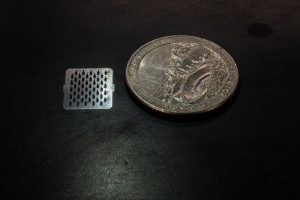UI College of Nursing and Eastern Iowa Community Colleges put nurses on fast track to nursing degree
The UI College of Nursing announced its official partnership with the Eastern Iowa Community Colleges in order to allow Iowa nurses the access to higher education in a seamless process.
The Nursing Building is seen on Tuesday.
December 6, 2018
The University of Iowa College of Nursing will try to allow more students to engage in its nationally ranked program with competitive admission through the “Registered Nurse to Bachelors of Science in Nursing in 3+1.5” program.
Eastern Iowa Community Colleges will now partner with the UI to provide for an easy transition for community-college nursing students to head to the UI through the program.
UI College of Nursing Dean Julie Zerwic said the UI has two B.S.N. programs. The first involves traditional students who enter the nursing program after their first two years of college. The second is the program with the community colleges — a “transfer” with a student who spent three years in a community college, earned an associate degree in nursing, and then transitioned into a final year at the UI.
“We are trying to work with community colleges throughout Iowa to create similar partnerships because we want to give individuals access to the education that is provided here,” Zerwic said.
The Eastern Iowa Community Colleges made changes to the programs to align with the UI’s, Zerwic said, thus making the program available to students.
RELATED: Business courses now available to UI pharmacy students to give a competition edge
“As individuals start in the community college, they are able to see what the requirements are and be able to plan their semesters up until graduation,” she said.
The College of Nursing hopes to reach out to students all over the state and allow them the opportunity to take part in the program, Zerwic said. She said the goal is to have 80 percent of the workforce prepared at the baccalaureate level; Iowa is currently just over 50 percent.
“There is strong evidence that patient outcomes are improved with a workforce that is baccalaureate-prepared,” she said. “You have a reduced morbidity and mortality if the institution that is caring for you is baccalaureate-prepared.”
Zerwic said the online program aims to improve health care in Iowa and reach students wherever they live, with the exception of some clinics that take place in their surrounding areas.
Cheri Doggett, the college’s academic program management specialist, said the UI is doing a great service for nursing students in Iowa.
“The best thing about this program is that students can live and work in communities and get their B.S.N. at nationally ranked school,” Doggett said.
With the projected nursing shortage, the need to bring in more students is on the rise, Zerwic said.
The U.S. Bureau of Labor Statistics projects the employment of registered nurses to grow 15 percent by 2026, outpacing the national average of growth compared to other jobs. Iowa will need to recruit people to the profession in the coming years — the Iowa Board of Nursing reports that 44.9 percent of registered nurses in Iowa are 50 years old or older.
This year, the UI nursing school increased the number of traditional-program undergraduate students accepted into the program from the previous 72 to 80, Zerwic said. In a year and a half, the spring admittance class will receive another increase.
The “3+1.5” program will accept a varied number of students. Zerwic estimates this number to reach approximately 100.
UI nursing student Dylan Hartford said he endured the struggle of attempting to apply to a nationally ranked school and thinks this program will do wonders for “nontraditional” nursing majors.
“Students who cannot access a large university will still be able to complete an undergraduate degree, which many states may start requiring for their nurses,” Hartford said. “This program is also very important in reversing the nursing shortage that is nationwide due to its creating more opportunities for students and those already working as nurses to continue and receive their degree from the University of Iowa.”






